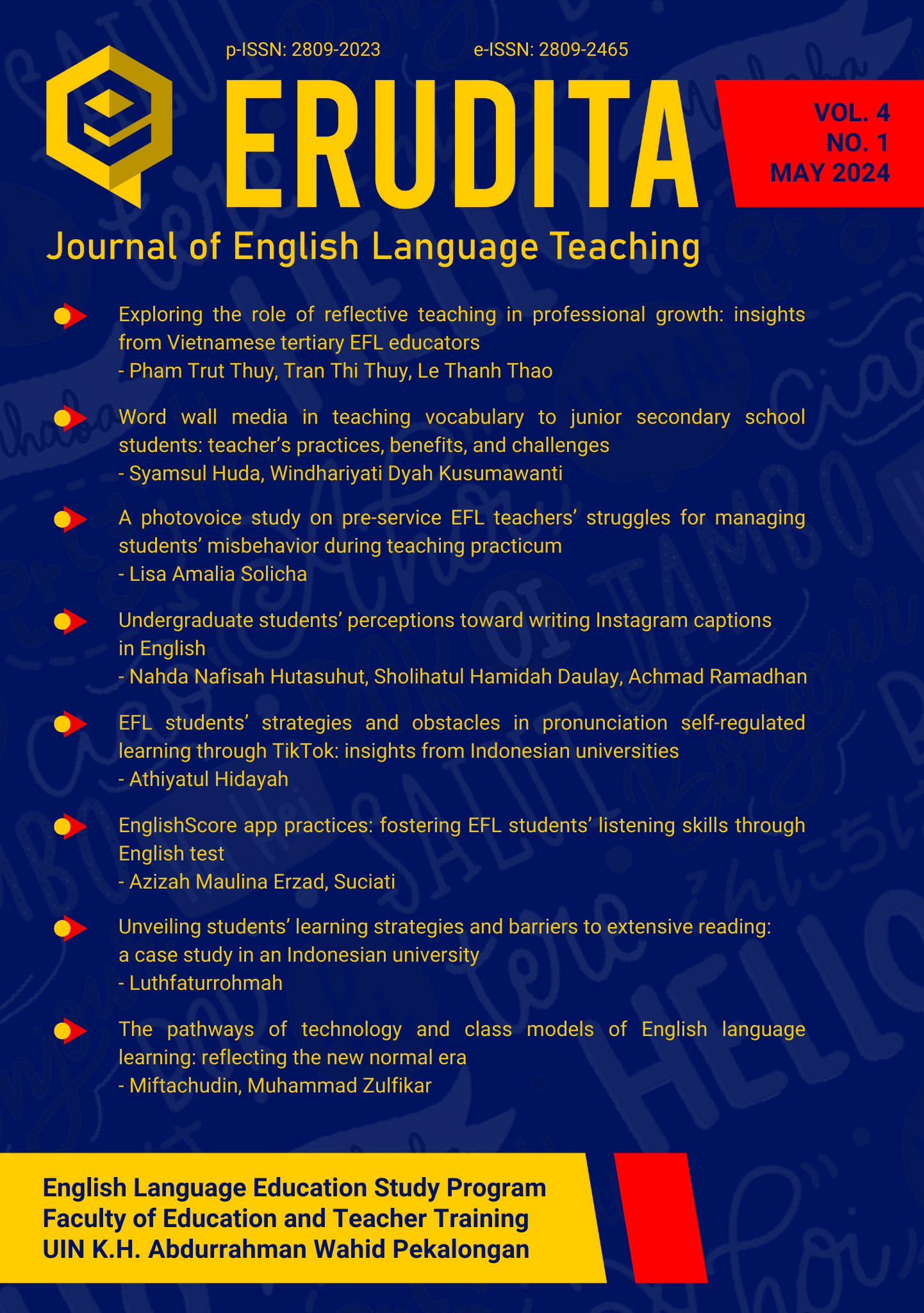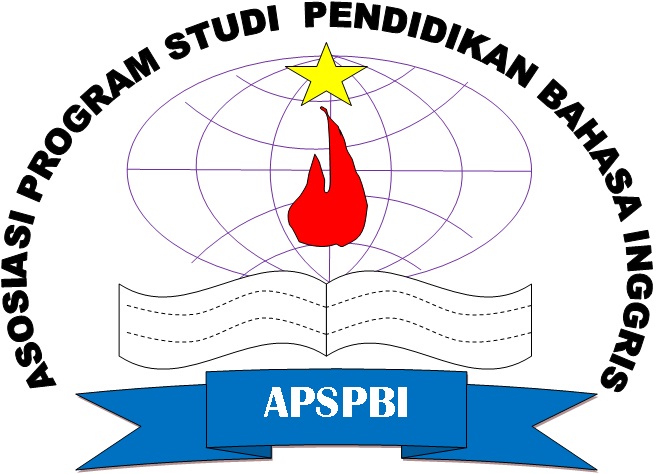Unveiling students’ learning strategies and barriers to extensive reading: a case study in an Indonesian university
DOI:
https://doi.org/10.28918/erudita.v4i1.8519Keywords:
Extensive reading, Guessing from context, Paraphrasing, Predicting, University EFL studentsAbstract
The present study aims to investigate students’ learning strategies and barriers encountered in extensive reading activities. This research was designed with a qualitative case study method. The study recruited six Indonesian university EFL students majoring in English language education to participate and a lecturer in the study program. Data were garnered through semi-structured interviews as a data collection method. The data were analyzed thematically to find emerging themes. The research findings demonstrate that the EFL students employed three extensive reading comprehension strategies. The three strategies included predicting by inferring the meaning of unfamiliar words by making guesses based on the context, guessing from context by utilizing previous knowledge about the topics in the text, and paraphrasing by creating sentences from the obtained information. Another finding also uncovers the university students’ barriers in extensive reading, including the students’ language background and lack of interest in reading. This study concludes with practical implications for how EFL students engage in extensive reading with various learning strategies and how university teachers boost their students’ interests in more diverse extensive reading activities.
References
Afzal, N. (2019). A study on vocabulary-learning problems encountered by ba English majors at the university level of education. Arab World English Journal, 10(3), 81–98. https://doi.org/10.24093/awej/vol10no3.6
Alfian, A., Evto, R. H., Agriska, A., & Angelica, V. (2022). Exploring students’ learning strategies in extensive reading activity through narrative inquiry. Pedagonal: Jurnal Ilmiah Pendidikan, 6(2), 194–202. https://doi.org/10.55215/pedagonal.v6i2.5613
Archer, A. V. (2012). Analyzing the extensive reading approach: Benefits and challenges in the Mexican context. HOW: A Colombian Journal for Teachers of English, 19(1), 169–184. https://www.howjournalcolombia.org/index.php/how/article/view/44
Aukerman, M. (2013). Rereading comprehension pedagogies: Toward a dialogic teaching ethic that honors student sensemaking. Dialogic Pedagogy: An International Online Journal, 1, 1–31. https://doi.org/10.5195/dpj.2013.9
Bailey, E. (2015). Reading comprehension skills: Making predictions. https://readingstrategiesmsu.weebly.com/predicting.html
Braun, V., & Clarke, V. (2006). Using thematic analysis in psychology. Qualitative Research in Psychology, 3(2), 77–101. https://doi.org/10.1191/1478088706qp063oa
Çetinavcı, B. M. (2014). Contextual factors in guessing word meaning from context in a foreign language. Procedia - Social and Behavioral Sciences, 116(1999), 2670–2674. https://doi.org/10.1016/j.sbspro.2014.01.633
Dewi, A. C., Rachman, N. A., & Imran, M. Al. (2023). Lack of interest in reading can have a negative impact on academic achievement. International Journal of Global Sustainable Research (IJGSR), 1(2), 273–282. https://doi.org/10.59890/ijgsr.v1i2.600
Escudero, I., Fuertes, N., & López, L. (2018). Paraphrasing strategy in EFL Ecuadorian B1 students and implications on reading comprehension. English Language Teaching, 12(1), 56. https://doi.org/10.5539/elt.v12n1p56
Gilakjani, A. P., & Sabouri, N. B. (2016). How can students improve their reading comprehension skill? Journal of Studies in Education, 6(2), 229–240. https://doi.org/10.5296/jse.v6i2.9201
Harini (2021). EFL learners’ perception of the project-based learning method in extensive reading course. Erudita: Journal of English Language Teaching, 1(1), 87–99. https://doi.org/10.28918/erudita.v1i1.4527
Huang, Y. C. (2015). Why don’t they do it? A study on the implementation of extensive reading in Taiwan. Cogent Education, 2(1), 1–13. https://doi.org/10.1080/2331186X.2015.1099187
Iftanti, E. (2015). What makes EFL students establish good reading habits in English. International Journal of Education and Research, 3(5), 365–374.
İlter, İ. (2017). Improving the reading comprehension of primary-school students at frustration-level reading through the paraphrasing strategy training: A multiple-probe design study. International Electronic Journal of Elementary Education, 10(1), 147–161. https://doi.org/10.26822/iejee.2017131894
Mu, H. E., & Green, C. F. (2012). Challenges in Implementing extensive reading in Shanghai senior high schools. The Proceeding of the First Extensive Reading World Congress (pp. 34–36). https://erfoundation.org/proceedings/
Nation, I. S. P., & Waring, R. (2019). Teaching extensive reading in another language. Routledge. https://doi.org/10.4324/9780367809256
Ro, E. (2016). Exploring teachers’ practices and students’ perceptions of the extensive reading approach in EAP reading classes. Journal of English for Academic Purposes, 22, 32–41. https://doi.org/10.1016/j.jeap.2016.01.006
Robbani, A. S., & Khoirotunnisa, U. (2021). Online English comics as reading materials for English language education department students. European Journal of Educational Research, 10(3), 1199–1213. https://doi.org/10.12973/eu-jer.10.3.1359
Salameh, L. A. M. (2017). Investigating the effect of extensive reading on EFL learners’ reading attitudes at Hail University in KSA. Journal of Education and Practice, 8(8), 7–15.
Siregar, S. D. (2019). Contextual guessing technique in reading. English Education : English Journal for Teaching and Learning, 7(1), 29–44. https://doi.org/10.24952/ee.v7i01.1650
Stoller, F. L. (2015). Viewing extensive reading from different vantage points. Reading in a Foreign Language, 27(1), 152–159. https://core.ac.uk/reader/323110106
Widodo, H., P. (2014). Methodological considerations in interview data transcriptions. International Journal of Innovation in English Language Teaching and Research, 3(1), 101–107.
Wijaya, K. F. (2022). Investigating English education Master students’ perceptions on extensive reading strategy. Polyglot: Jurnal Ilmiah, 18(1), 19–32. https://doi.org/10.19166/pji.v18i1.4113
Wutthisingchai, S. (2022). Creation of learning strategies for development of English reading skill by the extensive reading in EFL classroom. Asian Journal of Education and Training, 8(3), 85–94. https://doi.org/10.20448/edu.v8i3.4079
Yamashita, J. (2015). In search of the nature of extensive reading in L2: Cognitive, affective, and pedagogical perspectives. Reading in a Foreign Language, 27(1), 168–181. https://nflrc.hawaii.edu/rfl/item/324
Yang, X. (2016). Study on factors affecting learning strategies in reading comprehension. Journal of Language Teaching and Research, 7(3), 586–590. https://doi.org/10.17507/jltr.0703.21
Yu, L., Yu, J. J., & Tong, X. (2023). Social–emotional skills correlate with reading ability among typically developing readers: A meta-analysis. Education Sciences, 13(2), 1–22. https://doi.org/. https://doi.org/10.3390/educsci13020220
Yulia, M. F. (2018). Extensive reading for Indonesian university students: An alternative framework for implementation. LLT Journal: A Journal on Language and Language Teaching, 21(2), 207–218. https://doi.org/10.24071/llt.v21i2.1616
Downloads
Published
How to Cite
Issue
Section
License
Copyright (c) 2024 Luthfaturrohmah

This work is licensed under a Creative Commons Attribution-ShareAlike 4.0 International License.















